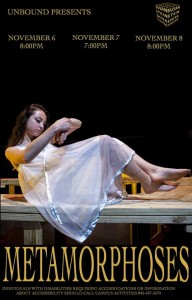 What haunts you, drives you? Are they different or are they the same things? Vices and virtues can be tricky concepts that govern our choices, sometimes without us even realizing it. Whatever the case, we can say that the changes we effect on ourselves and our environments trigger reactions.
What haunts you, drives you? Are they different or are they the same things? Vices and virtues can be tricky concepts that govern our choices, sometimes without us even realizing it. Whatever the case, we can say that the changes we effect on ourselves and our environments trigger reactions.
These are the notions Metamorphoses kept me thinking about long after its showings last November 6-8. Unbound presented Mary Zimmerman’s play, based on David R. Slavitt’s free-verse translation of The Metamorphoses of Ovid, at the Shiva.
A number of cautionary tales illustrated human nature through archetypal representations in non-linear ways. The subjects of each narrative fell victims to their own decisions, whether it was unconditional devotion, incurable greed, or compulsive desire, among other attitudes. Vignettes were framed by King Midas’ myth, and certain elements prevailed throughout the plot. Water was one of them.
During the talk back at the end, the cast and crew shared that they had very brief rehearsal time with the pool of water that was central, literally, to the show. Nonetheless, they successfully used it in evocative and meaningful ways. Water wasn’t a prop, it was a symbol, a sound, and perhaps even an entity in itself.
Water is where Paradise is set, it’s where the laundresses summon the stories of Midas, and ultimately where Midas finds his salvation. When his vice becomes a virtue that ironically deprives him of his own daughter’s vitality, he realizes the only solution is to find the mystical pool with the cure. So he sets out in a journey. Previously, Midas hadn’t believed in the importance of family, but the visible loss of it revives the affection towards his daughter that was virtually inexistent. Was he troubled because he thought he lost his daughter, or because he couldn’t bear the thought of losing? Either way he is moved to revert his condition, bestowing a higher value upon life than ostentation. Daughter and father are ultimately reunited, and the play ends.
In one of the introductory tales, a narrator explains how to world came to order from chaos. The fact that every story ends in some sort of resolution following an arc reflects this repeated restoration of order.
I wonder how these stories connect to contemporary times. Are there fundamental codes that determine our fate based on choices? Is moral dualism as clear and consequential as it was perceived in earlier times? Perhaps seeing things in such light obscures the complicated realities that we face today. These stories are complex ways to see simple concepts. They are simple because they are straight forward: love, loyalty, betrayal. But these ‘vices and virtues’ don’t act in isolated systems, nor are they mutually exclusive.
The presentation of Metamorphoses depicted a clear contrast between how we would like to see the world, and how it is. How simple it would be to pinpoint cause and consequence: to discern clean-cut outlines that provide some sort of relief from the confusion and anger inherent to existence. In Metamorphoses as in life, actions have consequences. Or so we’d like to think.
